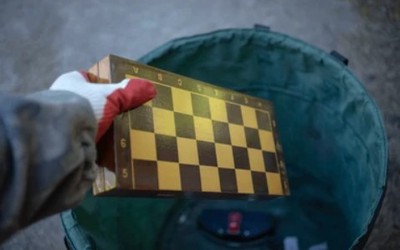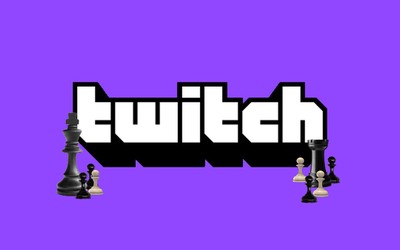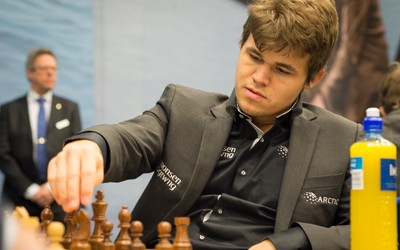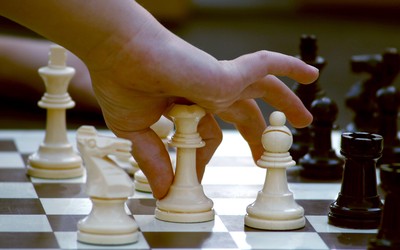
piqsels.com
How not to Break Down on Defeats and Why
Some tips for you, also based on my personal experiencesHello everyone, and welcome to this new blog post.
I think most of you are here because you are tired of experiencing chess defeats as a profound personal defeat, which then affects your self-esteem.
If you sometimes (or often) feel like this, you're very similar to me.
To help you, as I imagine I'm not the only one to be very sensitive in situations of defeat, I would first like to start from the reasons why one can feel really bad in these situations, and then get to give you practical advice on how to deal with them both mentally than physically.
I'll also tell you about some personal experiences and how I'm trying to get out of it, being known that living chess in this way takes away the taste for fun that should never be missing, even in case of loss.
Having said that, I wish you a good read!
The main causes of felling defeat
In my personal experience and hearsay, these are the main causes of this sense of devastation:
- High expectations from ourselves (sometimes almost impossible)
- Expectations from friends/relatives
- Search for perfection
- Fear of disappointing yourself
- Not being able to put all of yourself into the game and not being able to fully exploit your abilities (my case)
(other causes as big drop in elo points or losing against seemly worse/stronger players are related to most of this things above I'm going to explicate)
In the next paragraphs, I'll talk about each cause I've mentioned above and I'll try to help you facing your difficulties and continue your chess career on a more serene and pleasant path to take :-).
High Expectations from Ourselves
This is not my personal case, but I believe it is quite common in chess as in other sports.
If you have this issue, you probably train very often but you don't get great results.
In this case, I think the best thing to do is to objectively understand that you don't lose because you are not practicing enough or are not good at chess: if you practice consistently most days, then you shouldn't think that your training or your abilities are the problem, as there are many factors that affect the outcome of a match.
For this, I really advise you to deeply analyze some of your games, both online and played in live tournaments, and analyze the error in depth. For example, you might ask yourself, "Was this an actual mistake or a momentary oversight?" "How long did I think before playing that move? Did I move too fast without thinking about the consequences?"...etc
If it was an actual mistake, then you should accept that it can happen, maybe you just need to play more live, or it was a miscalculation, but it can happen! So, let it go and don't get discouraged, with the passage of time, constant training, study and gradual improvement, I'm sure you'll get good results. Take mistakes as a lesson, and you're on the right track!
If your mistake was an oversight, you shouldn't worry too much if it happened to you in blitz, bullet and rapid games, as it's totally normal, but I'll stop if it happens to you in standard timed games:
Here I advise you to take some time with yourself and understand the reason of your mistake. Here you may have misused the time you had available and I do not suggest that you continue in this way: rather, it is better to lose for time. So give yourself time, you're not a calculating machine and you won't be, but you can always do better. Time is the clue!
However, oversights can also happen to players with low self-esteem, like me: I have to say that sometimes while calculating the best move, I give myself two or three options, one of which seems to me more correct than the other two (and it is). The interesting thing is that the more I overthink my decision, the more I become convinced that the move I have chosen is wrong, so I finally choose one of the other two, that are actually less accurate then the firts move i selected.
If you are like me too, I think we both should trust ourselves more. After all, thinking too much is what sometimes pulls both of us down, but I think it's better to make a mistake trusting yourself instead of making a mistake with the remorse of knowing you could have played better!
Expectations from friends/relatives
Ok, I admit that this too has had an impact on making me extremely sensitive to defeats (in my case, were my parents. I always had very supportive friends luckily).
Personally, I've learned not to take criticism from my parents too seriously, as they don't know how to play chess, so things like "you can't do anything" or worse, "you will never get anywhere in your life" they shouldn't even matter to you, just, this things don't make sense at all. Stay realistic and objective as much as you can.
In this case, as I learned how to face this these criticisms based on nothing, I really reccommend to not listening to them. Really, not everything adults say is right, even though they sometimes believe it is.
I know it can be a very heavy and frustrating thing to deal with, especially for teenage players, as a parent should always value their child to keep learning and do better, but that's not the case for everyone. Precisely for this reason it is extremely important not to give weight to their words and to force yourself to believe in yourself and in your value.
Truly, you have value, and no one can take it away from you. If you are in this situation, these are the main tips on how to be more relaxed while playing and really start enoying chess completely:
- Don't argue with what your parents say, let them talk. Don't make the situation worse and focus on yourself and your peace of mind and mental health.
- Look for real friends among your chess knowledge. Since they are players like you too, most of the time they will understand you and give you all their support. Most will not judge you for who you are and what you are not capable of. In these situations, avoid toxic friends and people 100%.
- I suggest you talk to your chess teacher about your situation (if you have one), so that you can get honest feedback based on objective and realistic facts. If you don't have one, I really recommend it, a teacher always helps you in the right way.
- Just do your things and keep training and studying chess, so you won't stop your growth just because of their words.
- Break away from chess once in a while and dedicate yourself to other passions. Chess doesn't have to be an overly intrusive activity, get outside and play sports to get their words out of your mind.
Remember: the key is to focus on you and what makes you feel valuable and loved.
Now, let's talk about friends. In this case I don't think there is much to say, simply if your "friends" criticize you for your chess results, forget them and don't talk to them anymore. Such people are absolutely not ripe to judge you, and there's nothing you can do about it.
Find other friends, there's so much better people out there.
Talk only with who knows your value, do it for yourself.
Search of Perfection
I think this is one of the worst situations to find yourself in, as objectively we all know that in the world of chess perfection is truly for a few (but I don't know if it can be defined as perfection, I would call it talent, hard work and passion improved in time through great efforts).
If you always keep looking for perfection in each of your games, the first thing that comes to mind is that you have a lack of objectivity:
Perfection in chess is a beautiful dream, but unfortunately in almost all cases it will never come true (if you think about it, what would be great about chess if everyone was equal to Carlsen? Really, would you still want to play this way? Or rather, would you still play if you were perfect and had nothing to learn from your games? I think no one would play chess at that point, it doesn't make sense, it would not evoke curiosity).
So, if you think about it deeper and you agree with me, don't you think perfection would be a nightmare rather then a beautiful dream? :-) . (I'm so proud that I came up with this quote lol)
Therefore, stop thinking that perfection will carry you forward. Hard work and consistency will keep you going, and in a productive and healthy way.
And finally, remember these tips:
- Consistency > Perfection and Talent
- Trust the process of your growth
- Give youself time to understand what you study and learn from your mistakes for a healthy growth
- Have fun with chess, it is not about competition, but what you learn from it.
Fear of Disappointing Youself
I admit that sometimes I am afraid of disappointing myself, because I really love chess and I put a lot of effort into training, so if something goes wrong I feel very bad.
Unfortunately, sometimes I forget what I really play for and all the wonderful things chess has taught me from the beginning of my carreer to this day.
If you are always afraid to disappoint youself and all the efforts you put in chess, maybe define your self-confidence and intelligence basing on the results of your tournaments and matches, and there isn't a more wrong thing that this:
Let's take you as an example, pretending that you trained for more than a month to prepare for an important return and then score less than half of the points.
Of course you'll feel a little bad, but there's no need to call yourself dumb or dull about it.
As mentioned before, there are several reasons why one can lose, such as anxiety, agitation, bad personal period...
You should base your self-esteem not on the result, but on the quality of your work.
If, for example, giving a vote from 1 to 10 to the great work you've done you would give yourself the maximum points, but in the tournament you score only 4/10 points, you understand that there is a big difference.
Really, to be happy from your efforts I suggest you to:
- Stop evaluating your intelligence based on your results
- Reduce your self-esteem this way
- Believing that your efforts are in vain (they are not, believe me, they gradually make you improve. Everything comes at the right time)
Not being able to put all Yourself into the Game and exploit your Abilities
This is the main reason why my live tournament performance drops quite a bit, and maybe I'm not the only one.
It's like in online tournaments I always give the best I can, while in live tournaments many times I play moves that I would never have done in an online game.
This problem personally, I think it arose due to the fact that I started playing tournaments in 2020, but unfortunately the club I registered with had temporarily moved the rapid tournaments online for reasons of covid, so after about a year playing online tournaments, i felt a little confused when playing on the 3d chess board.
Aside from the confusion, I was very nervous in my first long-term tournaments as I had very little practice playing live, in fact they didn't end as well as I'd hoped.
So, from my personal experience, these are the best tips I can give you:
- Try to play more live matches, not necessarly in tournaments, but it's a good idea to find a chess club where to play sometimes with other people
- Do as many tournaments as you can, so if your first of them will not end so well, you still practiced skills like time-management, emotions control, tactical skills, etc..
- Analyze all your games after your touraments and sign up for new ones to keep you trained
- Talk about it with your chess teacher
The purpose of this blog post
I decided to write this blog post both to share my personal experience and to help you in case you are in similar situations. After all, chess is not just competition and results, but there is much more behind it, a community, and I think it is really important that we chess players support each other.
I wrote all this also because I understand how it feels in these situations and not knowing how to get out of it, sometimes help from someone is the thing you need most.
That said, I hope you found answers and solutions and I hope you have a wonderful journey in the chess world.
If you have any questions or topics you would like me to talk about in my blog, feel free to write to me!
This is also why I love chess, I like helping other chess players like me and making new acquaintances.
Remember that chess is a game and you should enjoy it completely! The rest will come with time! And...
Remember your value, always!
See you on the next blog post!
More blog posts by Sofia_E_2009

Why you shouldn't give up anything in life
A blog post about how chess recently made me think I shouldn't give up anything, not even my chess c…
Twich for Chess: the best Chess Streams right here
Here there are some Twich Streamers you should follow
Carlsen Clips that Made my Day
Carlsen Clips that Made me Laugh